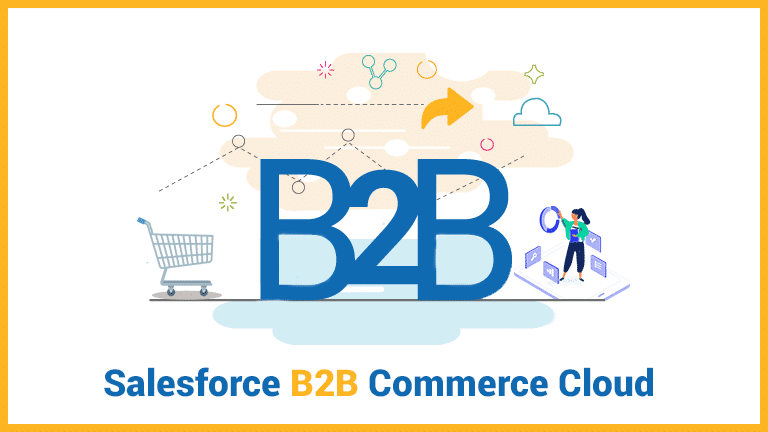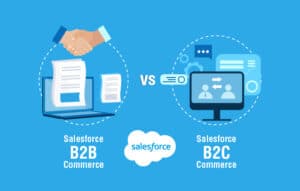In the ever-evolving landscape of e-commerce, businesses are constantly seeking innovative solutions to enhance their B2B operations. Salesforce B2B Commerce Cloud emerges as a powerful platform designed to meet the unique needs of business-to-business transactions. This comprehensive guide will walk you through the key aspects of Salesforce B2B Commerce Cloud, from its features and benefits to implementation best practices.
Understanding Salesforce B2B Commerce Cloud
Overview of B2B Commerce Cloud
Previously known as CloudCraze, Salesforce B2B Commerce Cloud is a powerful marketplace designed exclusively for business-to-business transactions. It offers an integrated approach to managing customer connections and transactions by integrating easily with the Salesforce product suite.
Key Features and Functionality
- Product Catalog Management: Skillfully arrange and showcase a wide variety of goods catered to business-to-business clients.
- Pricing and Quoting: Capabilities for sophisticated B2B business negotiations, including flexible pricing structures and quoting.
- Order management: Optimized order tracking, fulfillment, and processing to guarantee a positive client experience.
- Connectivity with Salesforce CRM: For a consistent picture of customer interactions, there is a smooth connectivity with Salesforce CRM.
Advantages of Salesforce B2B Commerce Cloud
Enhanced Customer Experience
B2B purchasers are intended to have an easy-to-use experience with Salesforce B2B Commerce Cloud. A happy customer journey is enhanced by responsive design, tailored product recommendations, and intuitive interfaces.
Scalability and Flexibility
Businesses of all sizes can profit from B2B Commerce Cloud’s scalability. The platform adjusts to your changing needs regardless of the size of your business.
Data-Driven Insights
Use data analytics to your advantage to learn important things about consumer behavior, tastes, and industry trends. Make wise choices to promote company expansion.
Salesforce B2B Commerce Cloud Training
To fully utilize this powerful online platform, businesses must invest in Salesforce training. These training courses are carefully crafted to equip users with the know-how needed for efficient platform navigation and optimization.
These sessions offer participants comprehensive insights by covering a wide range of topics, such as order management, pricing and quoting strategies, product catalog management, platform customization, and seamless integration with Salesforce CRM. Best practices for strategic planning are heavily emphasized in the training. That the platform’s deployment smoothly fits the organization’s particular business needs.
Additionally, the emphasis is on user adoption, with training programs designed to provide teams with the expertise required to easily utilize the platform’s functionalities. As a dynamic solution that changes with the ever-evolving e-commerce landscape, B2B Commerce Cloud makes continual training essential to keeping businesses ahead of the curve. By optimizing the platform’s capabilities, this strategy boosts productivity, improves client satisfaction, and eventually promotes long-term company growth.
Implementation Best Practices
Strategic Planning
Analyze your business requirements thoroughly before implementing. Establish precise goals, lay out a plan, and make sure it all fits in with your overarching business plan.
Customization and Configuration
Customize the platform to your unique business requirements. Set up pricing structures, workflows, and product catalogs to correspond with your particular B2B procedures.
Training and Adoption
Invest in team training sessions to guarantee a seamless shift to the new platform. Promote user adoption by highlighting the advantages and productivity gains made possible by Salesforce B2B Commerce Cloud.
Best Practices for SEO
- Optimised Product Descriptions: Write product descriptions that are both visually appealing and search engine friendly to improve your product’s exposure.
- Mobile Optimization: To improve search rankings, make sure your B2B Commerce Cloud storefront is mobile-friendly.
Content Marketing Strategies
Develop a content strategy that includes relevant blog posts, whitepapers, and case studies. Position your business as an industry thought leader to attract B2B customers.
Salesforce B2B Commerce Cloud Pricing
Understanding Salesforce B2B Commerce Cloud pricing is essential for companies thinking about using this e-commerce platform. The pricing structure is made to be adaptable to different business needs and sizes. The main component of the pricing structure are the subscription plans, which include features like order management, pricing tools, product catalog management, and Salesforce CRM integration.
User licenses add to the expenses in proportion to the quantity of platform users. The total cost also includes training sessions and implementation services. The pricing structure is flexible enough to allow for easy modifications to subscription plans as businesses grow. It will guarantee an open and economical integration of its into their operations.
Salesforce B2B Commerce Cloud Documentation
The official documentation is a valuable resource for companies that are new to Salesforce B2B Commerce Cloud. From basic setup to sophisticated customization, this centralized hub provides users with a plethora of information that walks them through every aspect of the platform.
Explore feature overviews covering pricing strategies. CRM integration, and product catalog management. While troubleshooting guides and FAQs offer quick solutions, developers can dive into API details and coding best practices.
Participate in the community forum to exchange ideas, keep abreast of release notes, and make the most of training resources, such as webinars and tutorials, to increase your skill level. In essence, this documentation is the essential companion, unlocking the full potential of B2B e-commerce endeavors. Also Visit this link for more over the in depth details Wiki Link.
Conclusion
Salesforce B2B Commerce Cloud is a comprehensive solution that is particularly useful as businesses continue to navigate the complexities of B2B transactions. Using the feature-rich platform and best practices for strategic implementation, this guide offers a roadmap for maximizing the capabilities of B2B Commerce Cloud. With Salesforce, embrace the B2B e-commerce of the future and grow your company to new heights.











